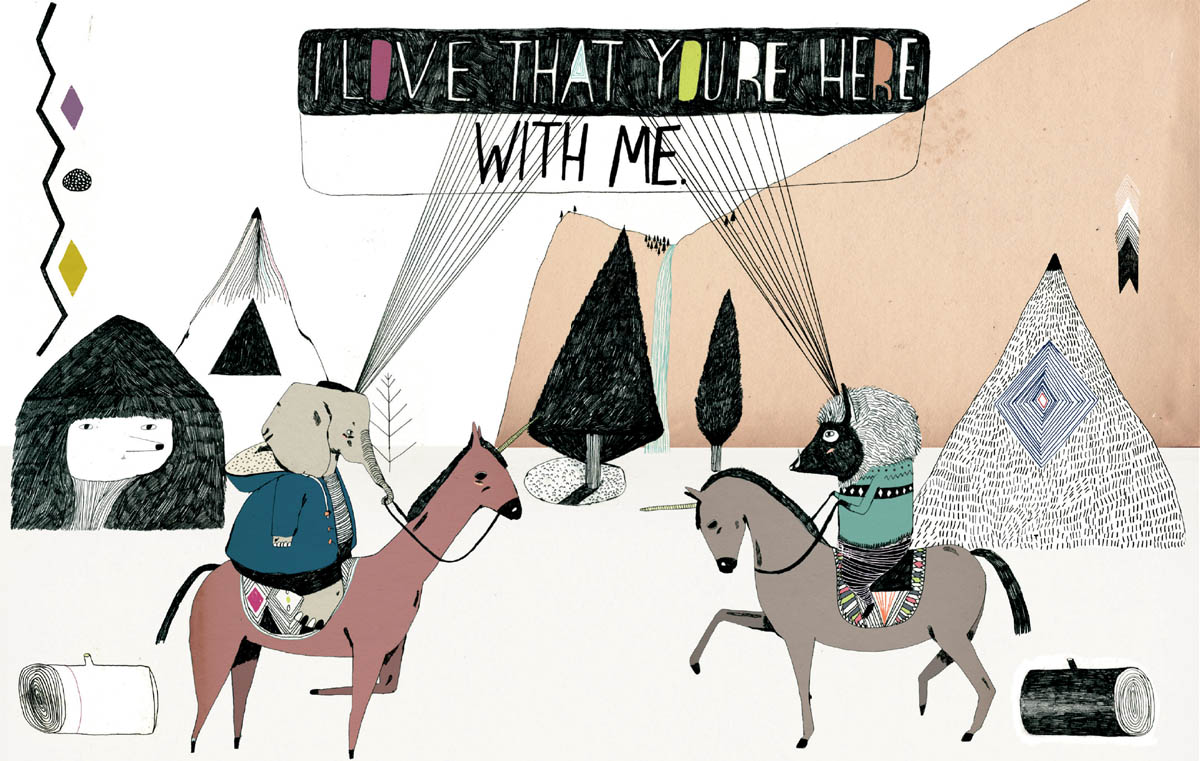Julia Pott is a British artist who lives in Brooklyn, New York. It might be tempting to call Julia an illustrator, although that wouldn’t be quite enough. Her drawings are fantastic, but you should see what happens when she brings these little critters to life through her quirky, beautiful, award-winning animations. Actually, you could go and look right now on her website.
JC—Are you formally trained or self-taught?
JP—I went to Chelsea for foundation, then Kingston University for a BA in illustration and animation, and then an MA in animation at the Royal College of Art. Years before all of that I would buy Beano comics with my pocket money and redraw every single page, detail for detail, then resell them to my parents for 30 pence. It was the most intense training I had, and it was also a harsh introduction into the world of the struggling artist.
JC—Which artist(s) do you admire most?
JP—It would have to be between Wes Anderson and Woody Allen. I would love a career where I could both write and direct my films, and people would have the confidence in me to let me try new things, explore unchartered territory, but still have a very distinct voice—which I think both these directors encapsulate in their own way.
JC—What inspires you?
JP—I love fiction and have favorite authors who create incredibly visual worlds and can perfectly express a very specific feeling in just one sentence. John Irving, J. D. Salinger, and Kurt Vonnegut are among those writers. I keep a book of quotes from books I like and will look through it when I’m feeling particularly stumped.
Live-action films are another big go-to for me—narratives that mix very human emotions with horror and humor and also have wonderful aesthetics, films and shows like E.T., Gremlins, Harold and Maude, Twin Peaks, Buffy, When Harry Met Sally (although not a heck of a lot of horror in that one . . . perhaps they missed a trick there!), and anything by Woody Allen. Radio shows like Radiolab, This American Life, and The Story Collider are a great source for ideas.
Just being out and about with people I connect with can have a huge influence on my thought process—someone can tell a funny anecdote and it sparks a new idea.
JC—Have you ever thrown a drawing away?
JP—My most popular print, Wooly Bear (opposite), is something that I almost threw away because I didn’t like how it was turning out. I was on the last page in my sketchbook so I had no choice but to power through, and it taught me never to give up on a drawing.
JC—How do you handle criticism?
JP—Not. Well. When someone criticizes you it can be crushing, and can sometimes stop you in your tracks. It’s the old cliché that you need a thick skin, and it’s true. You also need to know whose criticism is worth listening to. Some people do know better, and you should seek these people out early and keep them around—show them everything you do. It can be so difficult to take something completely personal and show it to someone and ask what’s wrong with it. But if you don’t do it, what’s wrong with it is going to stay in there, and you won’t know because you’re too close to it.
Criticism when something is finished is a whole other story. At the end of the day it’s all a matter of taste; not everyone is always going to like what you do, and hearing people critique it can feel degrading and unnecessary because there’s nothing you can do to change it. But you can learn for next time—every piece of work is an opportunity to improve, and becoming accustomed to criticism is one of the biggest lessons you can learn. Also, don’t listen to Internet trolls.
JC—Describe how you feel during a creative block.
JP—Whenever I’m in a creative block, it can feel like it will never end. I start Googling alternative careers. In the beginning of a creative block I have a tendency to think back on past jobs and remember how I got started, where I looked for inspiration, how it all got made. I always remember it as this idyllic, hazy memory with rainbows and singing birds where inspiration struck me on my walk home for lunch: I rushed home and the film just flew out of my pencil while I laughed and watched Buffy.
Of course, that is never the case—every time you start a new piece of work it’s torturous. Everything you come up with seems rubbish, pointless, you second-guess yourself every step of the way—and this kind of thinking can eventually lead to a roadblock in your brain where you just shut down.
It is never very helpful to try to compare it to past work and try to one-up yourself. It puts an overwhelming amount of pressure on, and stress and creativity is not a great mixture. In reality, the first film I made probably was the easiest, the most natural to make, because I had no yardstick to compare myself to. So if you approach every film like that—with the openness and excitement you had in the beginning of your career—then the block can be pushed through.
Also watch a lot of movies and read a lot of books—there may be an idea nesting in that brain of yours that just needs a little bit of a push. The more things you expose yourself to, the more your work will benefit.

Whenever I’m in a creative block, it can feel like it will never end. I start Googling alternative careers.